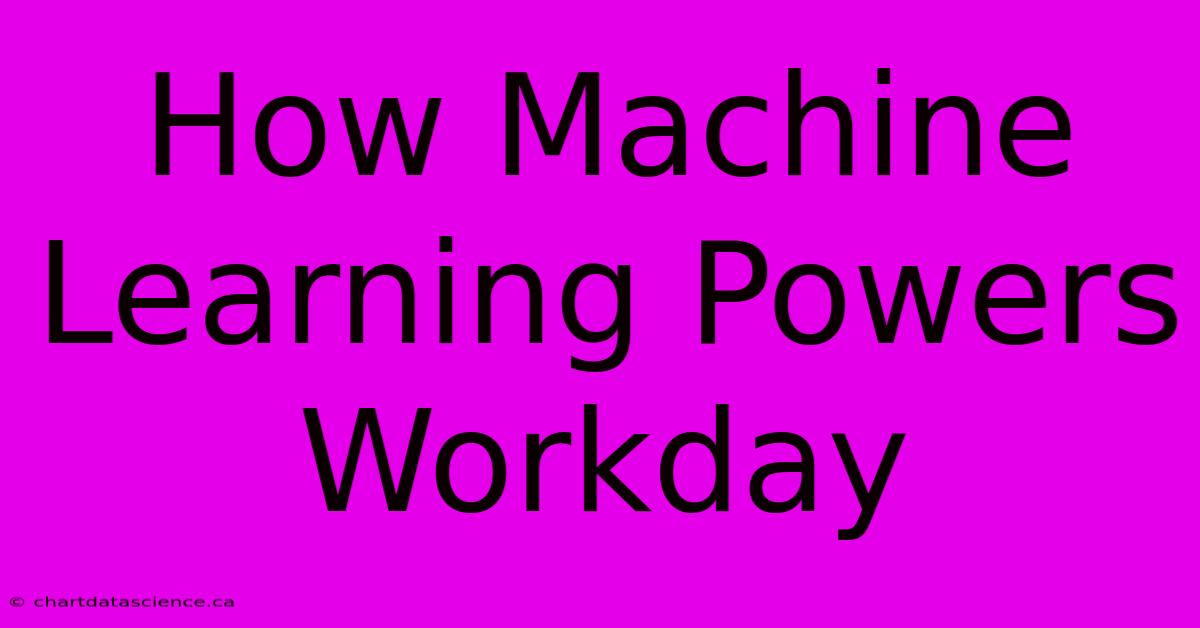How Machine Learning Powers Workday

Discover more detailed and exciting information on our website. Click the link below to start your adventure: Visit My Website. Don't miss out!
Table of Contents
How Machine Learning is Powering Up Workday
You've probably heard the buzzword "machine learning" thrown around a lot lately. But have you ever stopped to think about how it's actually impacting the software we use every day? One company that's heavily invested in ML is Workday, a leading provider of cloud-based enterprise resource planning (ERP) solutions.
Workday isn't just using ML to make its software "smarter" – it's using it to completely revolutionize the way we work.
Making Sense of the Data Deluge
Let's face it: businesses are drowning in data. From employee performance to customer interactions, there's a constant stream of information flowing in. But what good is all that data if you can't actually analyze it?
This is where ML comes in. Workday uses powerful algorithms to sift through mountains of data and find patterns that humans might miss. This allows them to:
- Predict employee turnover: By analyzing employee performance data, Workday can flag employees who are likely to leave. This allows HR teams to intervene early and potentially retain valuable talent.
- Automate payroll: No more manually entering time sheets! ML can automate the payroll process, saving businesses time and reducing errors.
- Improve recruiting: By analyzing resumes and job descriptions, ML can help identify the best candidates for open positions.
Personalizing the Employee Experience
We're all unique individuals, and our needs at work are different. But traditional software often treats everyone the same. Workday is changing that by using ML to personalize the employee experience.
- Tailored learning recommendations: Workday can analyze your job role and performance data to suggest relevant training courses. This ensures you're always developing your skills and keeping up with industry trends.
- Personalized performance feedback: Instead of generic feedback, Workday can generate personalized insights based on your strengths and weaknesses. This allows you to focus on areas where you need to improve.
- Targeted benefits offerings: ML can analyze your demographic and lifestyle data to recommend benefits that are most relevant to your needs.
Workday is just one example of how ML is transforming the workplace. By leveraging the power of algorithms, businesses are becoming more efficient, employees are more engaged, and the future of work is becoming more personalized and intelligent.

Thank you for visiting our website wich cover about How Machine Learning Powers Workday. We hope the information provided has been useful to you. Feel free to contact us if you have any questions or need further assistance. See you next time and dont miss to bookmark.
Also read the following articles
| Article Title | Date |
|---|---|
| Malaysia Condemns Ankara Attack Mg Flash | Oct 24, 2024 |
| Dalton Out Young In For Panthers Vs Broncos | Oct 24, 2024 |
| Clippers Leonard Out Weeks Knee Issue | Oct 24, 2024 |
| Suns Vs Clippers Odds Score Prediction Time | Oct 24, 2024 |
| Pre Market Watch Tesla Ups Lam Ibm | Oct 24, 2024 |
